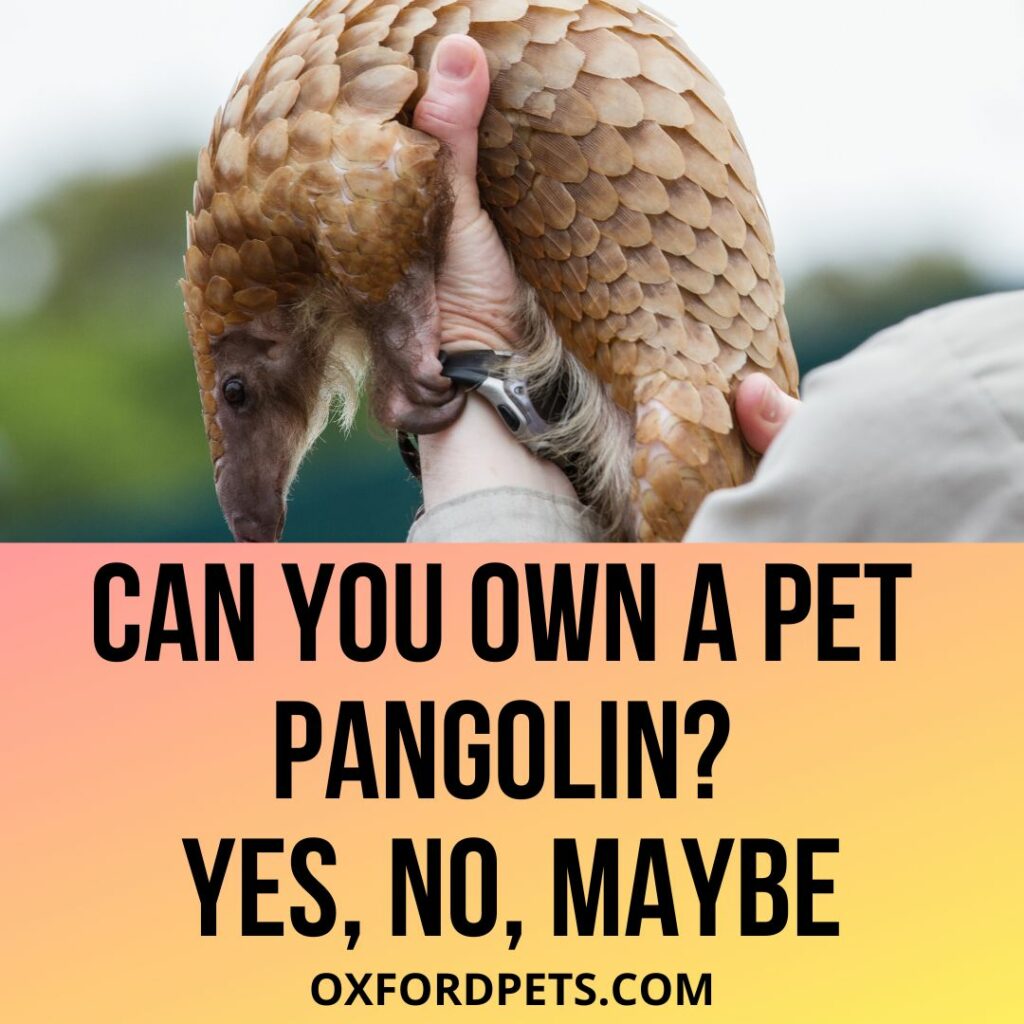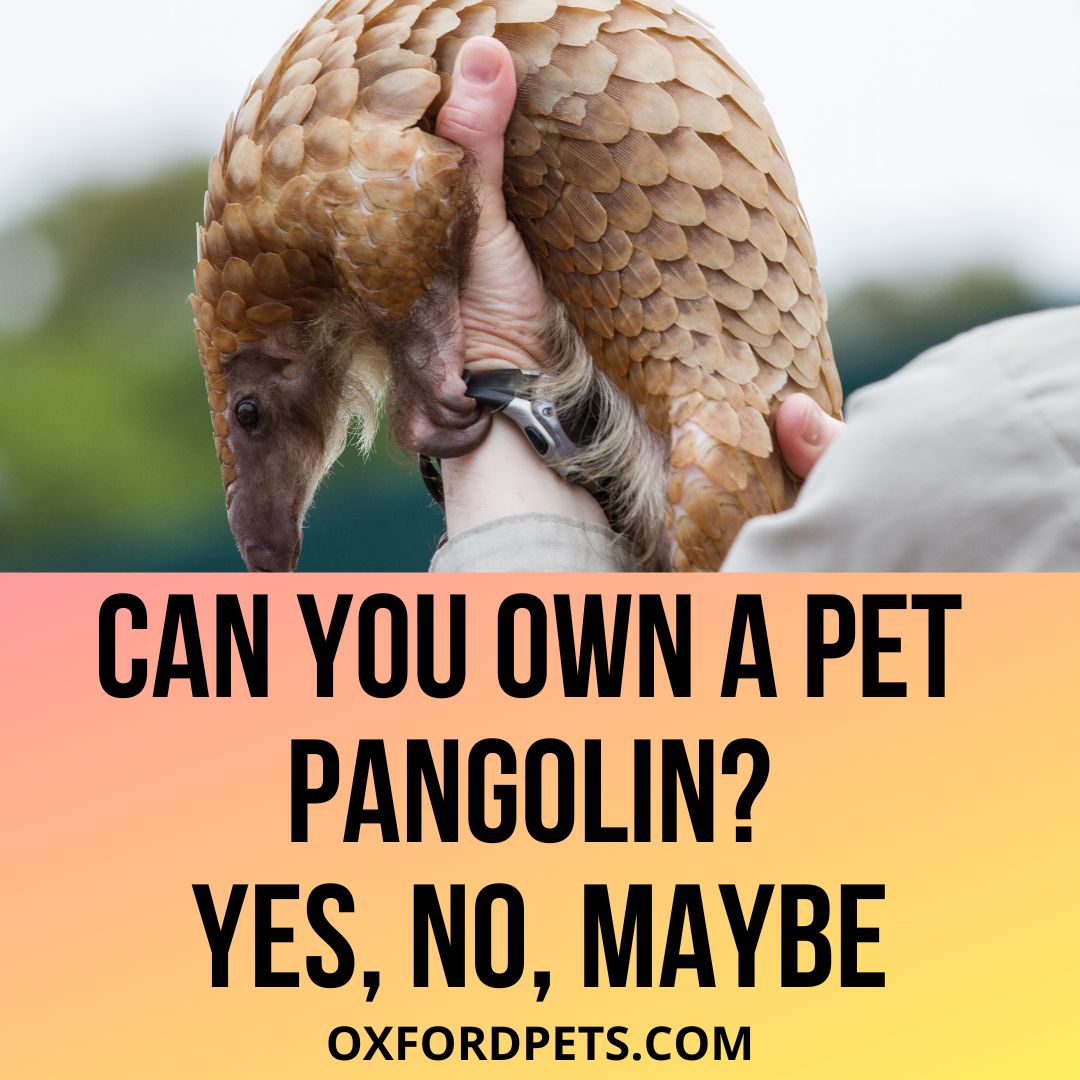Wondering if you can keep a Pangolin as a pet? Do you have the fantasy of keeping exotic animals as pets? Well, the thought though sounds exciting; however, keeping Pangolin and many other exotic animals as pets isn’t always a great idea. Why? Come, let’s learn.
Contents
Getting a Pet Pangolin: What You Need to Know
What is a Pangolin? Pangolin or Scaly anteaters are mammals commonly known for their unique body. Due to their long lizard-like body and scaly exterior, Pangolins are often confused with reptiles. However, in reality, they are placental mammals of the family Manidae (order Pholidota).
Pangolins have one extant family (Manidae) and three genera (Manis, Phataginus, and Smutsia). The former genera consist of four species, all of which are found in different parts of Asia.
At the same time, the latter two genera include two species, each of which is found in parts of sub-Saharan Africa.
Pangolins got their name from an Austronesian language ‘Malay.’ The original word pengguling which literally means ‘one who rolls up,’ bring Pangolin’s name to life.
Pangolins are huge with hard, large, overlapping, and plate-like scales. Their scales are made up of Keratin, a similar material that forms human fingernails and even is present in hair.
Often mistaken as reptiles, Pangolins have a large body that looks similar to a monitor lizard or a small crocodile. Though upon sensing predators, these animals roll/ curl their bodies similarly like a ball lashing out just their sharpy scales.

Where Does Pangolin Come From?
Talking about the Pangolin origins and what they evolve from? Like several other living beings present on earth, Pangolins, too, have been present for thousands of years.
They are prehistoric and have been around for more than 80 million years now. According to the Paleo-archaeological evidence, they might have evolved in parts of Europe.
Pangolins even fulfill a similar ecological niche to anteaters in South America; however, they are unrelated.
Though today, Pangolins are more commonly and only (probably) found in parts of China and India.
Pangolin Species Overview
| Name | Pangolin |
| Other Names | Scaly anteater |
| Scientific Name | Pholidota |
| Kingdom | Animalia |
| Phylum | Chordata |
| Class | Mammalia |
| Order | Pholidota |
| Mirorder | Ferae |
| Family | Manidae |
| Size | 1 to 3 feet excluding tail 10 to 28″ tail approximately. 10 to 60 lbs weight. |
| Lifespan | 4 to 8 years in wild |
Does Pangolin make good pets?
No, Pangolins make terrible pets, and thus keeping them is a very bad idea. Outside of their natural habitat and expect from others from their tribe, Pangolins find it difficult to adjust anywhere else.
That is why even individuals who have kept Pangolins as pets do not encourage the idea amongst others.
Not only people who keep Pangolins at home, but even several Zoos discourage bringing Pangolins out of their natural space (wild).
According to several Zoo keepers, Pangolins in their captivity died out of dietary issues and majorly because of stress.
The similar happened even after providing them with similar habitat and food as present in the wild.
Is it legal to keep Pangolins as Pets?
No, it is 100% illegal and unlawful to own, sell, or buy dead or alive Pangolins. They are the only mammal with scales, and this fact makes them very special.
According to the International Union for Conservation of Nature (IUCN), Pangolins are the most trafficked mammals in the world.
The numbers account for about 20% of all illegal wildlife trade. As per data prior to 2014, more than a million pangolins were poached just in a decade.
Focusing on this Convention on International Trade in Endangered Species (CITES) has strictly restricted the ban on the pangolin market, including all its eight subspecies.
Pangolins are also listed on IUCN from Vulnerable to Critically Endangered. Keeping them as pets or involving in any illegal activities related to Pangolins can lead individuals into deep trouble.
Are Pangolins legal in the U.S.?
In the United States and most other western countries, Pangolins are illegal for any kind of trading and possession. Even involving in dead Pangolins can lead individuals to a high level of legal trouble.
Not only people but organizations like Zoos need special permissions for bringing/ keeping a Pangolin in their facility.
What makes Pangolins illegal in the United States is their decreasing population. These creatures are protected as endangered in the U.S., and thus there are bans on importing or selling them across any of the 50 States.
Except for scientific or other conservation purposes, no other individual or organization can involve in any kind of buying/ selling of Pangolins.
Also, no matter how easily you might get a Pangolin, it isn’t safe to keep them in the U.S. It is since these mammals are not native to this part of the world, and it will prove very strenuous for them to survive here.
Can you have Pangolins as pets?
Pangolins are critically endangered, and thus one cannot have them as pets. They are special in many regards; however, they are best when left in the wild.
Besides how illegal and unlawful it is to keep Pangolins as pets, it is inhumane as well. Most Pangolins die an early death in captivity.
Even after providing the best living environment and fulfilling their dietary needs, these creatures find it difficult to make it anywhere else than in the wild.
Pangolins Housing Needs
Pangolins are typically found in both forests and grasslands. For sleeping, they prefer digging into deep burrows or finding hollow trees. However, Pangolins are adaptable to a wide range of habitats.
They can survive in agricultural fields, primary and secondary tropical forests, as well as limestone and bamboo forests.
Though most of them are territorial, and thus no matter which place they are native to, there will be certain sections they will mark as their territory.
Imitating natural habitats for Pangolins anywhere else than the wild is not a great idea. These scaly mammals won’t find it suitable to survive for long outside their native space.
Pangolins Temperature and Humidity Needs
Pangolins avoid exposure to extremely hot and cold climates.
The ideal temperature that Pangolins find comfortable to live in ranges between 18.1 degrees Celsius to 26.9 degrees Celsius.
Besides that, they need a constantly humid environment to regulate their body temperature.
Pangolins Dietary Needs
Pangolins are carnivorous insectivores. These scaly ant eaters, though, look as if they can make rabbits, deer, and other animals’ prey. However, in reality, they feed on ants, termites, and larvae.
Pangolins have a very sticky tongue that helps them catch prey from a distance. Their tongue sometimes extends even greater than their body.
Pangolins can consume about 140 to 200 grams of insects on a typical day. These mammals do not have teeth; however, their stomach has organ-like small rocks and pebbles that help in digestion.
Pangolin Cleaning
Pangolins, like any other animal in the wild clean themselves on their own.
It may read out as weird and gross, but Pangolins usually lie on their back, urinate on themselves, and rub it all over their belly as a form of self-bathing.
This is also one of the reasons that Pangolins are extremely smelly.
Common health problems with Pangolin
The most common health problem Pangolins suffer from is Vitamin A deficiency.
Most of them also suffer from eye problems since they originally had low eyesight.
How much does a Pangolin Cost?
Pangolins alive and as a whole aren’t meant for sale and purchase. Since it is illegal to import/ export, buy/ sell or make any trade with them, their cost can’t be estimated.
However, in the black market, different body parts of Pangolin are traded. For example, its scales can cost more than $3,000/kg. At the same time, its meat can cost $350 per kilo.
Where to buy a Pangolin? Where to find a Pangolin Breeder?
There is no legal market or certified breeder that deals in trading Pangolins. Since these scaly mammals are illegal for any kind of business, no individual can involve in buying and selling them. Even if one does, they can land into deep legal trouble.
Frequently Asked Questions
Are Pangolins Endangered?
As of 2021, on the IUCN Red List of Threatened Species, Pangolins are listed as critically endangered. That is why all of the eight pangolin species are protected under many national and international laws.
Can Pangolins survive healthily in captivity?
No, sadly, Pangolins find it very difficult to survive in captivity or in any artificial environment. Even shortly after getting captured from the wild, Pangolins die very soon. It is often noticed that many Pangolins died inside captivity even before they could have been transported to their destination. This happens since Pangolins are highly sensitive to stress, and they find it extremely difficult to make it anywhere else apart than in the wild.
How many pangolins are left?
The exact number of how many pangolins left in the wild isn’t present. However, according to scientists, their population is shrinking very quickly. As per an estimation, today, there are no more than 50,000 Pangolins in the wild. This number, though, is a huge mark; however, it is a critical digit for the world’s largest trafficking animal.
Are pangolins bulletproof?
No Pangolins aren’t bulletproof, but their scaly exterior provides them protection from anything pointy to pierce inside.
Are pangolins aggressive?
Despite whatever their rough exterior speaks, Pangolins are not at all aggressive. Instead, they get scared quite easily and thus roll up like a ball until the danger goes away. However, a noisy environment can bring aggressive, violent, and destructive behaviors in Pangolins.
Are pangolins blind?
Pangolins have very poor eyesight; however, they aren’t totally blind.
- Can You Own a Pet Kinkajou?
- Can You Own A Pet Coatimundi?
- Is It Legal To Own a Pet Dolphin?
Wrapping up…
Can you own a pet Pangolin? No, Pangolins are not meant for keeping as domestic animals. Unlike many other exotic wild animals, Pangolins can’t get house-trained, and neither can humans care enough for their well-being.
Besides that, Pangolins are critically endangered, and thus instead of keeping them as pets, it is important to spread awareness about protecting them.
Save Pangolins and let them survive in the wild since these creatures are an important part of our ecosystem.
